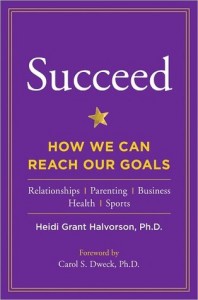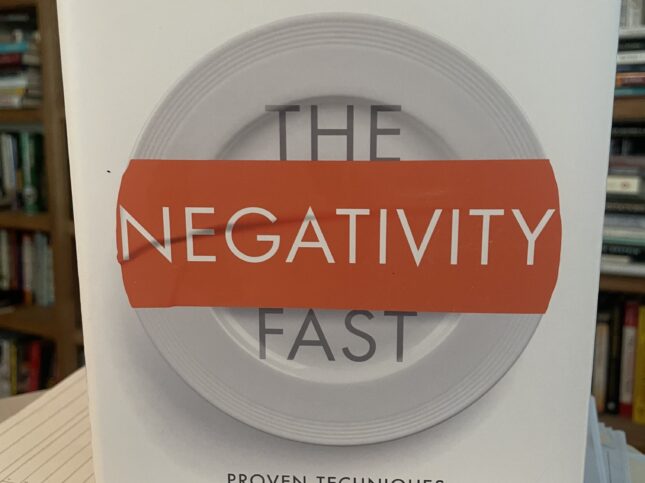Book Recommendation: Succeed by Heidi Grant Halvorson
 I bought Succeed: How We Can Reach Our Goals with limited goals in mind, but I received more from it than I expected or hoped. My intention in buying Succeed was not necessarily to learn anything new about success. After all, hasn’t everything already been said, and isn’t it all about common sense? No, I expected just to confirm what I already knew, but also to give it research backing so that I could write about it with confidence and credibility.
I bought Succeed: How We Can Reach Our Goals with limited goals in mind, but I received more from it than I expected or hoped. My intention in buying Succeed was not necessarily to learn anything new about success. After all, hasn’t everything already been said, and isn’t it all about common sense? No, I expected just to confirm what I already knew, but also to give it research backing so that I could write about it with confidence and credibility.
However, the nice surprise is that I unlearned some things I had taken for granted, and also learned some interesting, useful and powerful techniques to avoid procrastination and to stick with goals and tasks. Most importantly, I’ve even applied some of those lessons to make a real difference in my own productivity.
All goals are not created equal
All goals are not created equal; there are different types of goals and it does make a difference in your success. For example, ask goals can be oriented either toward promotion or prevention. Promotion goals are positive, in the sense that you are moving toward something. Prevention goals are focused on avoiding something, such as failure or a bad habit. We all have a natural tendency toward one or the other. There is no universal right or wrong; there are advantages to each, depending on the situation. Promotion goals are useful when creativity or speed is required. Prevention goals help preserve accuracy and quality.
Goals can also be performance-focused or mastery-focused. As I’ve written in a previous article, performance goals focus on a set target, frequently in competition with others, and mastery goals focus on learning and getting better. Again, each has its advantages. As any sales manager knows, performance goals can be very motivating in the short run, but mastery goals seem to sustain people better when difficulties kick in.
Casinos love optimists
I learned about the right balance between optimism and pessimism, and how to move the dial depending on the situation. In general, realistic optimism is the practice of having confidence that you will succeed, but telling yourself it will be hard. Despite what the proponents of relentless positive thinking tell us, negative emotions such as fear and anxiety can actually be very helpful, if they make us prepare and plan harder and if they cause us not to be surprised when the inevitable obstacles crop up. As Halvorson says, “…people who believe goal pursuit will be difficult plan more, put in more effort, and take more action in pursuit of their goals.”
Look forward, not back
I learned that when you’re working on a project, it can be more motivational to focus on how much you have left to do rather than how much you have already accomplished, a fact that seems counterintuitive. I’ve tested this myself in my writing projects, and even while working out, and it seems to work, although maybe it’s just because I want it to.
Plan with intent
While it’s crucial to set goals, just as important are the type of goals you set. It starts with a strong goal intention, such as lose weight and exercise more. But when the day is over you realize that you didn’t do anything to further that goal. Maybe you just couldn’t get started, or you got sidetracked, or you simply forgot.
The solution is to form implementation intentions, which basically say, “I will do X when Y happens.” For example, “I will drive straight to the gym when I leave work at 5:30.” By being specific about what, when and where, you significantly boost the chances of executing your intentions. In various studies involving school assignments, exercising, breast self-exams, taking vitamins, etc., the effects of implementation intentions are dramatic, more than doubling the accomplishment of the goal.[1] They don’t even have to be written. I’ve personally found that just saying to yourself something like, “when I get home, the first thing I will do is…” somehow magically makes that thought pop into my mind. It has worked every time, (except for the times I’ve possibly forgotten about).
Reading a book like Succeed is useful for three reasons:
- It gives scientific backing to “common sense”, which adds confidence and credibility if you’re passing on these lessons to others
- It corrects some misleading or even harmful common sense we take for granted
- It gives a lot of practical advice and techniques you can use immediately
Whether you want to improve your own personal effectiveness, or that of your team, make it your goal to read Succeed.
[1] On of the other benefits of reading a book like this is that you get exposed to the primary research of others. I found this fascinating paper by Peter Gollwitzer which goes into greater depth.




